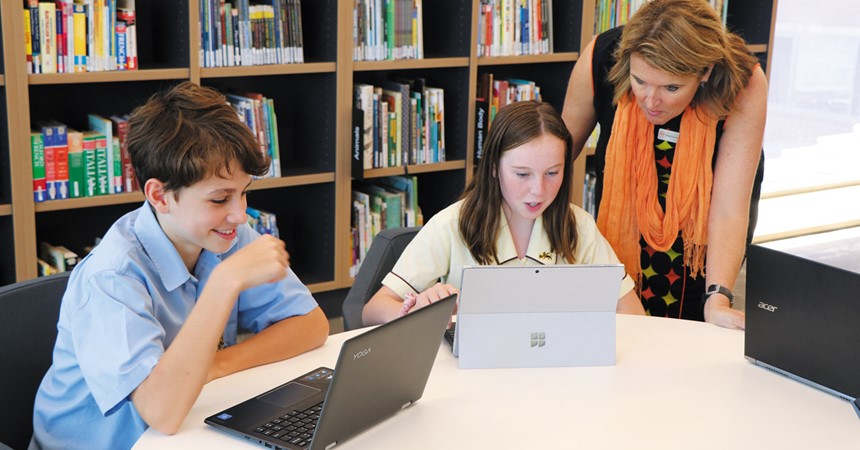While you will still find plenty of space dedicated to recreational reading, the development of new educational technologies and the increasing use of the Internet over the last decade have seen libraries become more and more important in education.
Sitting at the ‘heart’ of the school, libraries have been transformed into learning hubs that provide access to a variety of technological resources that enhance individual and group learning for students and aid teaching and learning requirements for staff.
They provide a place for students to connect with their peers around shared interests and on school-based collaborative work, while staff can utilise these spaces for their own development in delivering targeted literacy, ICT and information skills lessons and conducting professional gatherings.
The newly opened learning hub at St Pius X High School, Adamstown, is a perfect example of how these spaces have been transformed.
The ground floor of the new light-filled, two-storey St Pius X High School library accommodates a designated research area, a seminar room and research pods and houses a non-fiction collection to encourage recreational reading.
The upstairs entry level features circulation and reference desks, another teaching space and a substantial fiction collection.
“This library is a magnificent facility that will certainly enhance the learning experience of every student at St Pius’,” said principal, Robert Emery.
This new space gives students access to an array of resources to further their learning and collaborate on projects such as the school newspaper, mock trial and debating preparation, STEM projects and other tasks set by teachers.
“Not only is the building aesthetically appealing, it represents an important step in the school's long-term educational planning,” said Teacher Librarian at St Pius X, Stephanie Strachan.
“It supports current evidence-based research that ‘powerful libraries make powerful learners’ and is a visual reminder of exciting opportunities for collaboration and 21st century learning pedagogies.”
This evolution of the school library has also seen a shift in the role of the school librarian.
No longer just there to help students hire books and hush students to silence, the teacher librarian is a vital educator who continually evolves and adapts to suit the changing needs of the school community.
With library catalogues and resources now available 24/7, teacher librarians are constantly responding to current and emerging information systems and helping staff and students gain the skills they need to navigate this new online space.
As well as ensuring that staff and students are given the best possible access to available resources, the teacher librarian also sifts through vast sources of information available online to determine what is trustworthy and relevant.
On top of managing the resources and the library space, teacher librarians also provide professional development for staff, teach new skills and content, promote reading and continually provide data to support their programs.
Aside from the educational benefits, learning hubs are proving to have a positive impact on student wellbeing as they become warm, welcoming and inclusive retreats.
Regardless of what is happening at home or on the playground, libraries give students access to uninterrupted thinking time and provide a space where they know they can go and always feel supported.
These contemporary learning facilities are helping to develop the future of education and are creating successful, confident and creative learners.
“While the demise of books and the library has been a topic of conversation, I think we often forget that a book is just one way of distributing information,” said Teacher Librarian at St Paul’s Catholic College, Booragul, Kerri Beezley.
“Having new ways to distribute information has highlighted the importance of libraries and teacher librarians in equipping students with the skills to be information-literate and responsible digital citizens.”



























































































